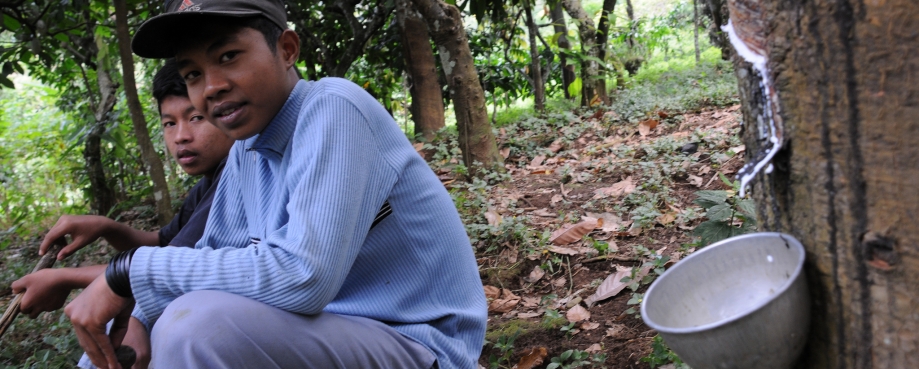
Cindy Berman is writing a series of three blogs focussing on the Prime Minister’s new modern slavery initiatives. Her first was on the findings of the Independent Review of the UK Modern Slavery Act one year on. Her second focuses on the announcement of a new £33m international fund managed by the Home Office to tackle modern slavery.
ETI's new Base Code Guidance: Modern slavery - practical guidance for brands and retailers.
Last week, the Director of Anti-Slavery International, Aidan McQuade and myself met with the Home Office’s Modern Slavery Unit to discuss their plans for the new £33 million international fund to tackle modern slavery.
We heard that there will be two funding streams within the fund:
- A challenge/innovation fund to support and pilot interesting or new approaches.
- A fund focused on priority interventions in key sourcing countries.
Ministers are to discuss and decide on the size and scope of these streams.
And, while £33m sounds like a lot, it actually doesn’t go that far; especially as it will be stretched over several years.
It needs to be spent wisely.
Here are nine pieces of advice on spending the money wisely
Armed with our collective experience and insight we offered the following ideas and advice on how the Fund can be used:
- Use the Fund in ways that enable Prime Minister, Theresa May to show real global leadership on modern slavery.
- Support credible investigation and analysis of what is driving modern slavery in specific countries and sectors. And then focus the funding on a select number of strategic issues, and support interventions that are based on sound evidence.
- Focus on prevention. We want to sort out this problem in the long-term, not continue to pick up the pieces. There’s a lot of work out there already on the criminal justice system – let the system of finding criminals, prosecuting and punishing them continue, but let’s use this fund to find the drivers and fix the systems that perpetuate the problem.
- Ensure that those most affected – the workers themselves – have direct voice and agency in how the funds are used. Far too many funding initiatives can be patronising, based on assumptions that people are victims, rather than agents of their own destinies. All people have rights, but some are better able to access their rights than others. As such, the funding should be used to enable people subjected to modern slavery to claim their rights.
- Learn from the mistakes of the past and ensure the funds do no harm. So much damage has been caused by well-meaning actors charging in with cash in their pockets to ‘rescue’ so called victims without asking what their circumstances are and what they need. Thousands of these victims have become ‘collateral damage’ – ending up re-trafficked many times over: I strongly recommend you read this excellent report by a group of experts before you decide what to do with the money.
- Add value to what is already being done. And work with other donors to complement their efforts rather than duplicating or competing. That’s confusing and unhelpful for those already doing valuable work.
- Map the key stakeholders with influence - including those that can enable or block change; understand their interests and identify the incentives that might cause them to understand, behave and act differently.
- Make available significant funding for independent experts to evaluate the impact of the funds. It is amazing how little robust evidence there is for the many millions that had been spent over many years on anti-trafficking and forced labour initiatives.
- Support what we know works. Brazil offers a great example. Its approach highlights the importance of working at different levels with multiple actors and interventions, combining:
- Strong laws and policies driven by serious commitment and resources by the government to implement and drive change. This includes an army of labour inspectors with investigative powers, strong police and judicial systems to prosecute and punish modern slavery crimes:
- Active and engaged citizens and non-governmental organisations working at local and national levels to support vulnerable workers; campaign and advocate for change with employers, industry bodies and government.
- Strong investigative journalism and a vibrant independent media.
- Strong and effective trades unions in key sectors.
- Industry leaders willing to stand up and be counted, and to speak out about unscrupulous companies for poor practices. They are fuelling a cycle of competition in a race to the top.
I hope Ministers will take advice from key stakeholders like ourselves, who are not afraid of complexity.
We know that the Fund has the potential to make a real difference, but it needs to take into account the multi-dimensional nature of the problem.
It has to build partnerships with those with a proven track record on tackling the issue.
Most importantly, it needs to listen to those who are most affected.
Sign up for our modern slavery training now. Or we can deliver it in-house for key staff and suppliers
The photograph of child workers on a rubber plantation in Indonesia is courtesy of the ILO and is for illustrative purposes only. It does not relate to an incidence of modern slavery.
